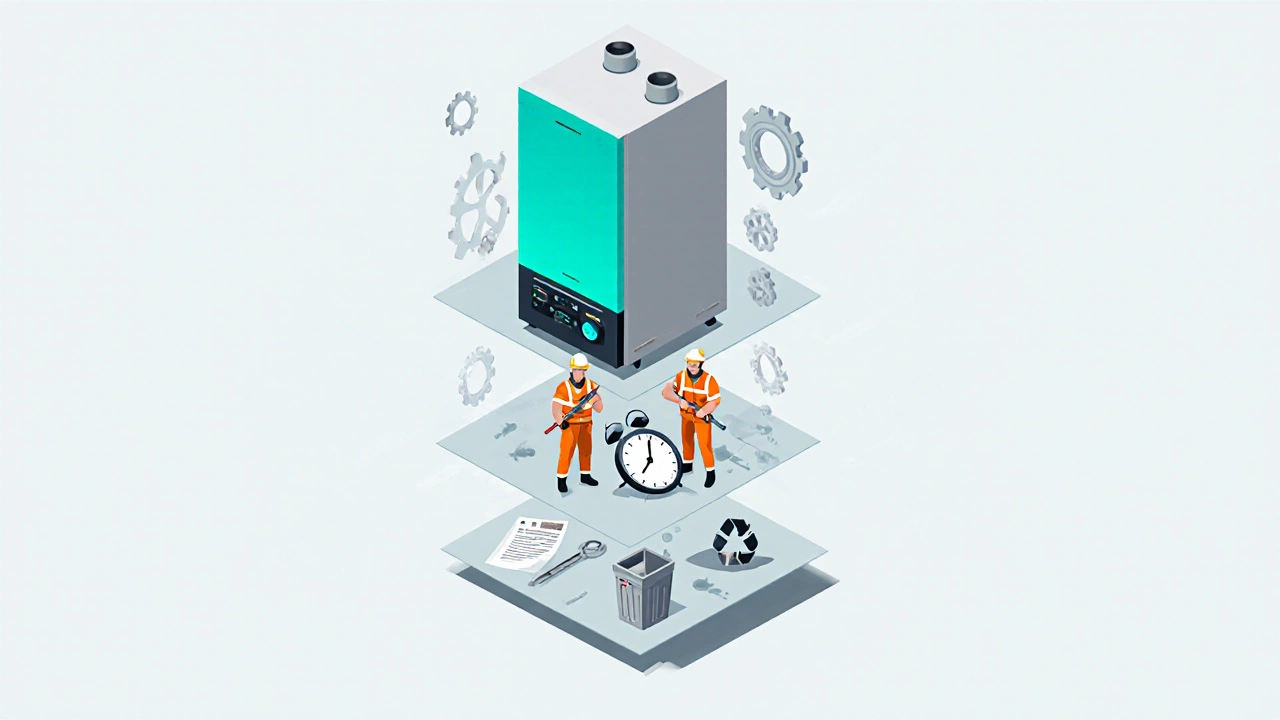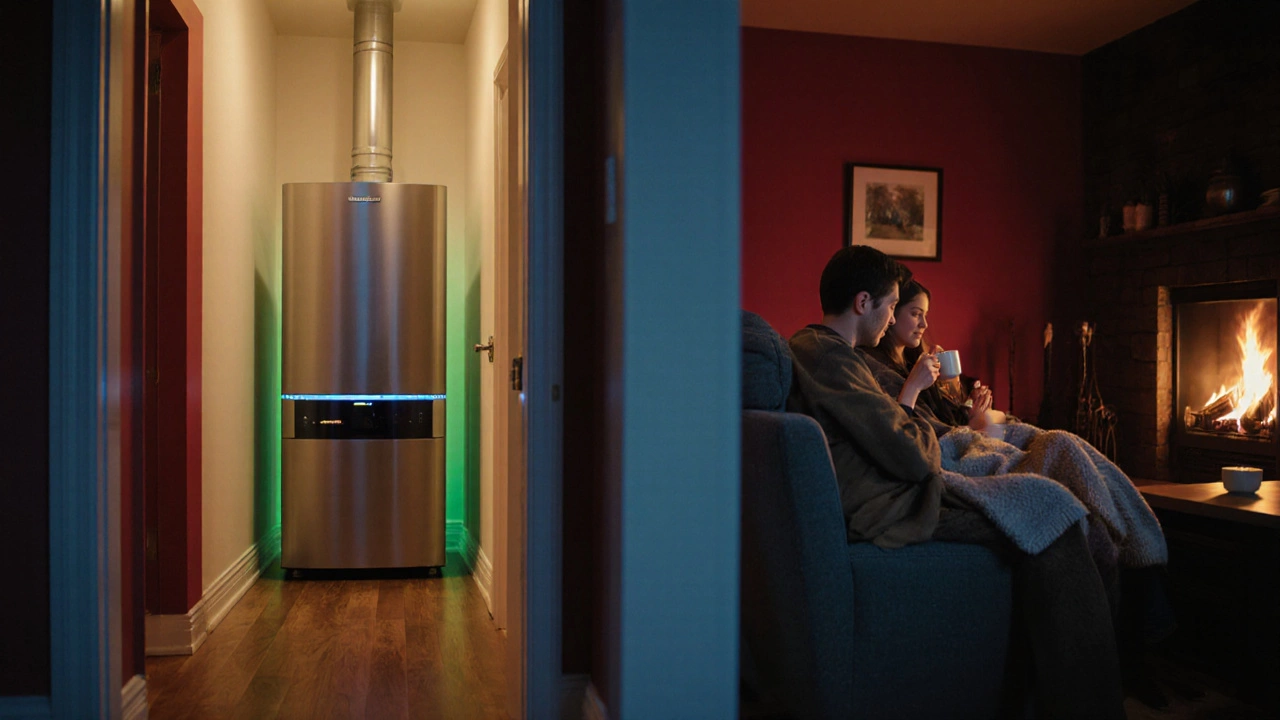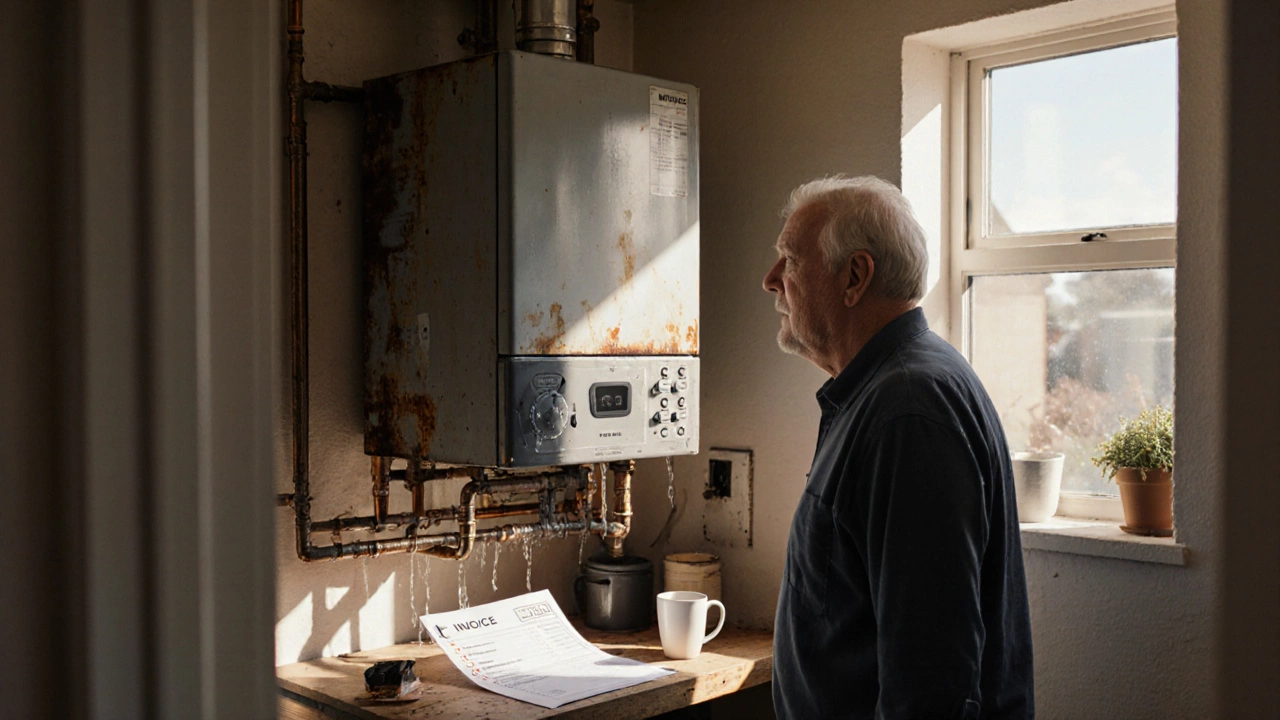Boiler Replacement Cost Calculator
Calculate Your Total Cost
See estimated costs for your specific boiler replacement project in New Zealand.
Tip: Installing in autumn or early spring could save you 5-10% off labor costs.
Getting at least 3 quotes can help you find the best price and service.
When your old boiler finally gives out, the quote you get for a new one can feel like a slap. You start asking, "Why does it cost so much to replace a boiler?" The answer isn’t a single number - it’s a mix of parts, labor, regulations, and long‑term savings. Below we untangle every line on that invoice so you know exactly where your money goes and how to lower it.
Key Takeaways
- Material costs dominate, especially for high‑efficiency models.
- Labor, permits, and disposal add 25‑40% to the total price.
- Choosing the right size and type can shave $500‑$1,500 off the bill.
- Off‑season installation and multiple quotes are proven cost‑cutters.
- Energy‑efficiency rebates can offset up to 30% of the upfront spend.
First, let’s meet the star of the show.
Boiler is a closed‑loop heating device that circulates hot water or steam to provide space heating and domestic hot water. It typically runs on natural gas, oil, or electricity and is the heart of many homes' heating systems.
What Drives the Boiler Replacement Cost?
Think of the total bill as three stacked layers: material, labor, and compliance. Each layer splits into smaller pieces, and each piece can vary wildly by region, brand, and house size.
Material Costs - The Boiler Itself
Not all boilers are created equal. Your choice of type, capacity, and efficiency rating sets the baseline price.
| Boiler Type | Initial Unit Cost (NZ$) | Efficiency Rating |
|---|---|---|
| Combi (compact, provides hot water on‑demand) | 2,500‑3,500 | 90‑95% |
| System (stores hot water in a separate tank) | 3,200‑4,500 | 88‑92% |
| Conventional (older, requires separate cylinder) | 2,800‑4,000 | 80‑85% |
| Electric (no gas line needed) | 3,500‑5,000 | 99% (no emissions) |
These figures reflect the Material Cost component, which usually accounts for 45‑55% of the total boiler replacement cost.
Labor and Installation Fees
Even the best‑priced boiler will be useless if you can’t get it hooked up safely. Labor covers removing the old unit, fitting the new one, connecting to gas, water, and electrical supplies, and testing the system.
Labor Cost typically ranges from NZ$800 to NZ$1,500, depending on the complexity of your existing pipework and the distance to the gas meter. In Wellington, tradespeople charge between $90‑$130 per hour, and a full install can take 8‑12 hours.

Permits, Inspections, and Regulatory Compliance
New boilers must meet local building codes and gas safety regulations. In New Zealand, a registered gasfitter must issue a compliance certificate, and you’ll often need a building consent if the installation involves structural changes.
The Permit fee is usually NZ$150‑$300, plus a $100‑$200 inspection charge. Skipping this step can lead to hefty fines or insurance issues down the line.
Energy‑Efficiency Ratings and Rebates
A high‑efficiency boiler costs more upfront but can save 15‑30% on annual heating bills. Many NZ councils and Energy Efficiency and Conservation Authority (EECA) programs offer rebates of up to NZ$2,000 for qualifying models.
Energy Efficiency Rating is expressed as a percentage - the higher, the less fuel needed to produce the same amount of heat. When you factor in the rebate, the net extra spend for a 95%‑efficient unit drops to around $500‑$800.
Hidden Costs You Might Not Expect
- Disposal of the old boiler - $150‑$250 for safe removal and recycling.
- Upgrading radiators or pipe sizes to match a larger capacity - $500‑$1,200.
- Unexpected issues like corroded flues or faulty gas lines - $300‑$800 extra.
- Extended warranty or service agreements - $200‑$400.
These items can swell the final bill by 10‑20%.

How to Keep the Replacement Cost Under Control
- Get at least three quotes from licensed Installation Companies. Compare not just price but warranty length and included services.
- Choose a boiler size that matches your actual heat demand. Oversized units waste fuel and increase cost.
- Schedule the install in the off‑season (autumn or early spring). Tradespeople often offer a 5‑10% discount.
- Check EECA’s most recent rebate list and apply before the installer finalizes the order.
- Prepare the site yourself - clear the area, shut off the gas, and remove any decorative covers. This can shave an hour or two off labor time.
Quick Cost Checklist
| Component | Low End | High End |
|---|---|---|
| Boiler Unit | 2,500 | 5,000 |
| Labor & Installation | 800 | 1,500 |
| Permit & Inspection | 250 | 500 |
| Disposal & Recycling | 150 | 250 |
| Potential Extras (radiators, pipe upgrades) | 0 | 1,200 |
| Total Estimated Cost | 3,700 | 8,450 |
These numbers are averages for a typical three‑bedroom house in Wellington. Your actual cost may sit anywhere within this range.
Frequently Asked Questions
How long does a boiler replacement usually take?
A straightforward swap of a similar‑capacity combi boiler typically takes 8‑10 hours, meaning one full workday. If you need new pipework or a larger unit, the job can stretch to two days.
Can I DIY any part of the replacement?
You can handle the demolition and site prep, but gas connections, pressure testing, and certification must be performed by a licensed gasfitter. Attempting DIY gas work is illegal and unsafe.
Are there any tax benefits for installing an energy‑efficient boiler?
The NZ government offers a temporary depreciation allowance for energy‑efficient assets, allowing you to claim up to 25% of the cost in the first year. Check the latest IRD guidelines for eligibility.
What warranty should I expect on a new boiler?
Most reputable manufacturers provide a 2‑year parts warranty, with options to extend to 5 or 10 years for an additional fee. Installation companies often add a 1‑year labor warranty.
How can I tell if my current boiler is the right size?
A heating engineer will perform a heat‑loss calculation using your home’s floor area, insulation level, and local climate. If the existing unit is more than 20% over‑sized, you’re paying for excess fuel consumption.

